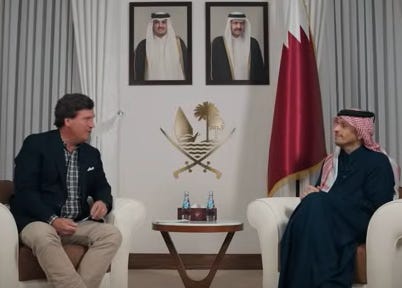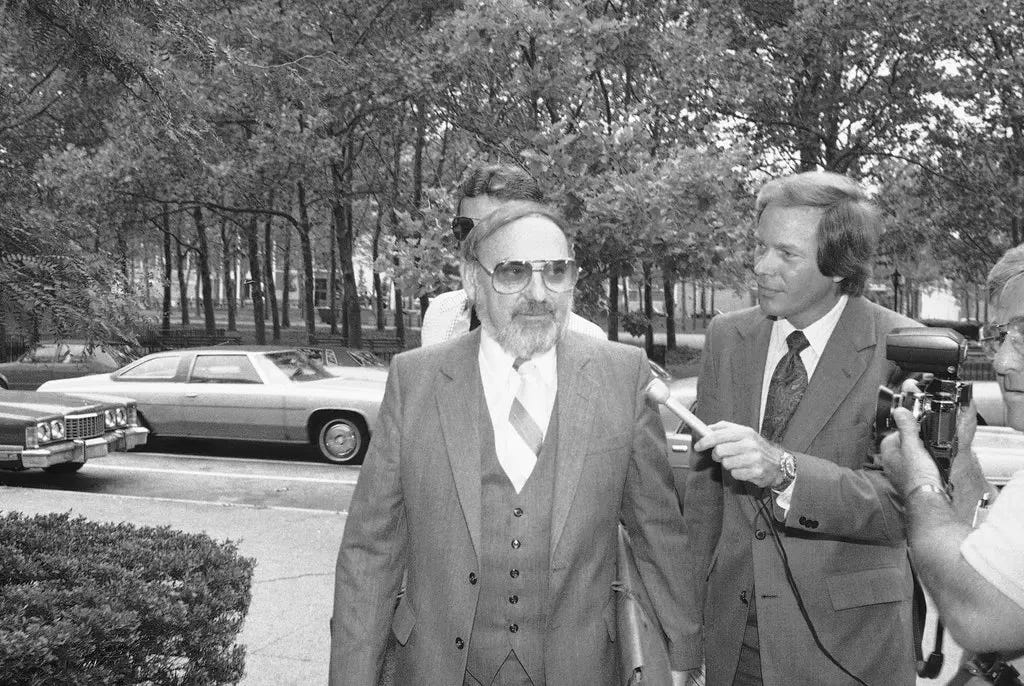Dr. Strangecarl - Or, how Tucker learned to stop worrying and love the Emir
While it is unclear whether he benefited financially from it, based on his interviews Tucker Carlson definitely has been a party to helping Gulf monarchies influence US policies.

Note: The writing of this story began prior to the now revealed allegations of Qatari lobbying and influence buying as publicised in the DC Examiner. Therefore some of the revelations may be excluded as this is primarily a commentary and critique of Tucker Carlson’s interview with the Qatari prime minister.
There has been a lot of noise this week about President Donald Trump’s visits to Saudi Arabia, Turkey, and Qatar and certainly it feels like the world is changing before our eyes. While he must be scrutinised and held accountable for any deals made with these conservative Islamic states, it remains to be seen what the ultimate fall-out will be. I have a lot of questions and concerns:
Is the United States merely doing business with the Persian Gulf monarchies?
Is this a play against China, Russia, or Iran?
Does this further entangle the US which is already committed to the defence of many of these states?
Should the United States be so quick to normalise relations with Syria without a guarantee of the safety of minority Christians, Alawites, Druze, and Kurds?
I could go on. I happen to be a person who sees it as a positive if Israel and the United States sever their foreign aid relationship. It’s about time, and I am gratified that at long last more people at least on social media are recognising that this is the right change even if it is very sudden and not under the most desirable of circumstances.
The US delegation that journeyed to Saudi Arabia had to maintain diplomatic protocol the entire time. That includes Commerce Secretary Howard Lutnick whose brother Gary was killed on 9/11 at the World Trade Center. I wonder how he must have felt in those palaces in Riyadh where perhaps he crossed paths with someone who may have been involved in supporting the hijackers. Other victim families have called upon Lutnick to pressure for the extradition of former embassy official Omar al-Bayoumi. I would support that demand, but it looks more like the trip was meant to bolster US trade with the Gulf states and increase security ties. Here is the stance I take on what Trump is doing: If it leads to a lasting peace in the Middle East and economic prosperity at home, then I will be pleasantly surprised. However, if it does not and we have the region revert to the same old bloodshed in the near future then Trump’s legacy will be that of a president who mortgaged America’s future away to a group of super wealthy oil princes. It will be Abscam supersized. And much of the ground laid for this seismic shift in foreign influence over the United States will have been done by people who putatively were attempting to remove Israeli influence.
When in Riyadh, forget Jihad

For those that don’t remember, Abscam was the FBI operation that busted a host of US politicians like Pennsylvania congressman Michael Myers for taking bribes from undercover agents posing as wealthy Arab sheikhs. I think that Tucker Carlson may have been facilitating an Abscam scheme on the American people based on two interviews he recently conducted. Once again, if I am wrong and the relationship proves to be fruitful for the US and the Arab kingdoms while preventing wars, then I will gladly give Carlson his due. On the other hand, based on the interviews he held of Saudi Prince Alwaleed ben Talal covered in my last newsletter and of current Qatari Prime Minister Mohammad bin Abdulrahman al-Thani, it seems more like Carlson was doing a promotional infomercial for these subjects and their countries and companies rather than a journalistic interview.
It should be admitted that the soft-spoken and measured demeanour of the prime minister lended the interview more credibility than Carlson’s baffling choice of questions. While it was not as awkward as his past interview of Vladimir Putin where he sat and was lectured on eleven centuries of Slavic history, the conversation with the Qatari premier had only one pointed question about whether Qatar was going to continue to drive toward its net zero carbon emissions goals. This ludicrous declaration, given that Qatar’s oil exports pay for 70% of its state spending, was just one example of how it is a largely one dimensional nation with leaders shrewd enough to market it to different foreign audiences with carefully tailored images.
Another topic Carlson framed in a one sided manner was Qatar’s hosting of the 2022 World Cup.
TC: So you had the World Cup a few years ago here. It was very widely covered around the world, and part of the coverage, maybe the majority of the coverage, was not about soccer, football. It was about your country and how it was, you know, needed to come into line with the social mores of the West, etc. There was a lot of lecturing about, to your country, about the way that you live. Did you feel that?
Al-Thani: The whole purpose of hosting the World Cup is to bring the world together in that country, to put the country in the spotlight about the football, about the tournament, and about people coming together. Unfortunately, countries and some NGOs try to use this as an opportunity to attack on values of the society itself, on the values of the country of the community by using it as an opportunity to change these values and to impose their own values on our country and our people.
They went on to discuss how western critics had bashed Qatar for refusing to champion LGBT rights and lifestyles as part of the World Cup 2022 festivities. But this was not the only reason, nor the primary one, that the world criticized Qatar as a choice for the event venue. Foremost among them were the unsafe and abusive working conditions that many of the foreign guestworkers in Qatar lived under. Then there was the fact that alcohol would be banned from the entire event, which is understandable given Qatar’s Muslim legal system but hard to reconcile with the reality that soccer fans watching the world over would be subjected to endless beer and liquor ads while those attending the game could not so much as imbibe a glass of wine.
By far the greatest cause for criticism was the process by which Qatar was awarded the 2022 World Cup to begin with raised eyebrows in 2010 when it was selected. At the time, Qatar’s men’s national football team was ranked 91st in the world had never qualified for the World Cup, and they would fail to do so for the following two contests in 2014 in Brazil and 2018 in Russia. Qatar does not even have a football club ranked in the top 100 worldwide, and its best footballer Akram Afif has played most of his career on the domestic circuit.
Behind maroon eyes
Another ludicrous part of the interview was when Carlson asked, without specifically referencing an example, why the western media is so antagonistic of Qatar. He cited Qatar’s status of having the largest US military base in the Middle East as the quintessential proof that the kingdom is a dependable US ally. This is a point of dubious value: the US has bases in Germany and Japan which may be military allies but have also been at times economic rivals. This distinction could also be a liability, because to 9/11 the US had air bases in Saudi Arabia, and this was one of the reasons that Al Qaeda attacked the United States before and on 9/11. The prime minister deftly explained that Qatar’s only agenda is to strive for peace in the region and around the world by mediating not only in the Israel-Palestine conflict but in Ukraine.
But here again it was clear that the interview was not about actually challenging a person in power, but rather curating his image. While on a personal basis Mohammed bin Abdulrahman may not have been involved, these are some arenas where Qatar has used its wealth and sometimes more to throw its weight around:
During the often criticised NATO intervention in Libya in 2011, Qatar sent its own ground troops for advisory and training roles with the anti-Qaddafi rebels and was supposed to take a lead role in forming the new government and military that would take the place of Qaddafi.
Qatar Investment Authority (QIA), the kingdom’s sovereign wealth fund, has been able to embed the small country into major foreign assets such as London’s Heathrow Airport and Islamabad airport in Pakistan’s capital. It owns a 10% stake in Volkswagen, the world’s largest automaker by volume.
Qatar Sports Investment, a subsidiary of the Qatar Investment Authority, owns interests in a number of sports clubs throughout the world, including France’s leading football club Paris-St. Germain and Monumental Sports, the parent company of Washington, DC’s NBA, NHL and WNBA franchises. This parallels a similar effort begun earlier by United Arab Emirates investors who purchased Manchester City FC in 2013 and have added to its parent company clubs across twelve other countries on four continents and Saudi Arabia’s sovereign wealth fund which owns 85% of Newcastle United FC.
Most importantly Qatar’s Al-Jazeera (AJ) television and news organisation is perhaps the most powerful in the Arab world, and one of the most powerful in the world at large. AJ has been at the forefront of attacking European and American governments that take restrictive approaches to immigration, choosing in an editorial decision in 2015 not to use the word migrants for people enter Europe on boats, but rather qualify them as refugees. AJ’s local operations have been banned in neighbouring countries such as the UAE, Saudi Arabia, Bahrain, Egypt and Jordan for the network’s perceived close relationship with Islamist groups in each nation. Since the launch of Operation Iron Swords by Israel in response to the 10/7 attacks, it has accused multiple AJ journalists in Gaza of being active members of Hamas and Palestinian Islamic Jihad (PIJ), both proscribed terror organisations.
I am not holding my breath that the current administration will be considering the strings attached to partnering with Qatar. The momentum within conservative and libertarian circles in our time is much more focused on the US decoupling from Israel and ending military aid, as more influencers by the day are chucking any association with the Jewish state or Zionist affiliations like the Daily Wire or PragerU. I’ve long felt like that process was inevitable even if it is not desirable to most Jewish Americans.
But it must be asked what purpose would there be in switching out Israel for Qatar, a country that harbored 9/11 mastermind Khalid Sheikh Muhammad when he was a fugitive for his connection to the 1993 bombing of the World Trade Center? Or how about the fact that in 2017, during the first year of Donald Trump’s first term Saudi Arabia, Bahrain, the UAE and Egypt all severed ties with Qatar and accused it of funding the Muslim Brotherhood and ISIS while having an unusually cozy relationship with Iran. There is much more that is too early to comment on. Does the new relationship with Qatar have to involve pivoting away from Israel or could it be that there is an emerging accommodation between the two states along the lines of the 2020 Abraham Accords? I don’t know when those living puzzles will be solved.




